 |
||||||||||||||||||||||||||||||||||||||||
|
||||||||||||||||||||||||||||||||||||||||
|
Crop Production |
Vedapuri Krishi Vigyan Kendra (VKVK), Thiruvannamalai District |
Weather |
||||||||||||||||||||||||||||||||||||||
Success Stories A. System of Rice Intensification Mr.Loganathan is a progressive farmer cultivating paddy for the last 15 years. He has been cultivating white ponni in Kharif season regularly. He is owning 10 acres of land. He used to spend more money in nursery preparation, seed rate, pulling out, transplanting and weeding operations. But, he was not satisfied with the economic returns. This is a common phenomenon for the past 3-5 years. In this situation, he on the advice of KVK followed SRI method of paddy planting to the extent of 10 acres. He raised the pai nursery for this purpose. He used just 8 kg of seeds per hectare. The area and the seed rate have been considerably reduced in this method when compared to conventional method. Transplanting has been taken up using 14 days older seedlings following prescribed roll marker method of planting. He carried out the weeding operations using rotary weeder as per the requirement. B. Hi-tech vegetable seedling production in protrays Entrepreneur name : Mr. Chandravaradhan, Chief Volunteer, Melpallipattu Farmers club Address : S/O Raja, Melpallipattu, Chengam taluk, Thiruvannamalai district – 606 703 Background of entrepreneur : Melpallipattu is one of the villages in Chengam block known for vegetable cultivation. A farmers club with 15 progressive vegetable growers as members was started in the village with the financial assistance of NABARD. The technical guidance has been provided by the Vedapuri KVK, Kilnelli. Mr. Chandavaradhan is the chief volunteer of the farmers club. He felt that availability of quality vegetable seedlings was a major problem in the village, as many farmers were bringing seedlings from Krishnagiri. He approached KVK for the technical help.
With a view to supply quality vegetable seedlings to the Melpallipattu farmers, the KVK had selected Mr.Chandravaradhan for the technical training on horticulture cum exposure visit under the RSVY programme. During the training, he had been exposed to technical and practical aspects of protray vegetable seedling production. Immediately after the training, he had started a protray nursery. The KVK provides regular technical support for the better maintenance of nursery as well as productivity improvement of vegetable crops in the village. Background of enterprise: The protray nursery was started by Mr.Chandravaradhan with a financial assistance of Rs.1.5 lakhs from Indian Bank. The shade net house had been constructed in an area of 4000 sqft. Total number of 1200 protrays had been accommodated in the shade net house with a capacity to produce one lakh seventeen thousand and six hundred seedlings at a time. C. Masalapowder preparation
They under went a training on preparation of Masala powders in KVK, during the month of April 2006. During the training, method of preparation for more than 20 varieties of masala powders had been explained with practical exposure. Immediately after the training they started a masala powder unit during the month of July 2006.
The raw materials are purchased from Chennai and packing materials from Sivakasi. On an average the production cost comes around 1500 rupees for 25 kg of masala powder. The usual size of the packing is 50 gms. The selling price is Rs. 8/50gm for the dosai powder and Rs. 4/50gm for the Turmeric powder. They have been earning an amount of Rs. 6000/- per month as net income from their small masala powder unit. Now, they registered their unit in DIC. They have also formed a marketing team consists of 30 progressive women representatives from various SHGs in Vandavasi Taluk for the successful marketing of their products. They have become a role model for others in the area of masala powder production in Vandavasi block of Thiruvannamalai district. D. Japanese Quail rearing Entrepreneur name : Mangani SHG,Udayam SHG,Chevanam,SHG,Kamatchi amman SHG,Thulasi SHG. Address : Dusi Nathakollai, Vempakkam block Background of entrepreneur : The following 5 SHG members are living in Dusinathakollai village of Vembakkam block. They started SHG 3 years back. However for the past 3 years they engaged in agriculture they started suitable enterprises for their lively hood they attended NABARD sponsored training conducted by SMS, Animal Science, Vedapuri KVK, Kilnelli during ’2007.
Intervention of the KVK :
Initially, they started rearing 200 Japanese quail with an investment of Rs.2600 (Chick cost, Feed cost and Medicine etc., ) They constructed quail shed with help of bank loan. They are selling the quails @ Rs. 18 /bird after 35 days. The mortality rate has been 15% in the 1st batch due to lack of enough experience. Japanese quail – Economic analysis
Presently they are rearing 800 quails / batch. They are also planning to increase the number of quails with the help of bank assistance. System of Rice Intensification (SRI)-A Boon to Paddy Farmers Agriculture is the main occupation of Thiruvannamalai district and paddy is the predominantly cultivated crop. The important problems in paddy cultivation in Thiruvanamalai district are low productivity, improper planting method, improper nursery management, indiscriminate use of chemicals and availability and cost of labour. SRI as a potential solution to the problems of paddy farmers Spread of SRI Technology SRI demonstration at KVK farm Steps taken by KVK to disseminate SRI technology
During the Rabi 2005-06, KVK conducted SRI technology demonstrations in 10 farmers’ fields. KVK scientists provided technical guidance and conducted regular field visits, training programmes, video shows and field days. The result was satisfactory for the farmers. In Rabi 2006-07, another 10 demonstrations have been conducted in Kayanallur village of Vandavasi block, KVK distributed Cono weeders and Rotary markers to the farmers. KVK is the pioneer in introducing Rotary marker in the district with a view to popularize the SRI technology. KVK scientists are also regularly participating in various activities conducted by the line departments ie seminars, farmers interest group meetings, ATMA activities, FFS etc., and encouraging the adoption of SRI technology. Details on the Spread of SRI technology in Thiruvannamalai District KVK has documented the spread of SRI technology along with State department of agriculture in our district. Japanese quail rearing – An alternative income source Mr.Murugan S/o Venkatesan is an unemployed rural youth who has been supporting his father in agriculture after completion of his higher secondary education. His family consists of seven members. They have four acres of rain fed land in which paddy , groundnut and brinjal has been cultivated. However, for the past four years he didn’t get good yield from the crops due to water scarcity in the area. As a result, he found it difficult to meet out his family requirements. He has done painting to earn additional income, but he could not continue the profession. He started searching for the alternate income source. He met subject matter specialists (Animal science) of KVK and discussed the various agri allied activities for the income generation during the year 2004 . Intervention of the KVK Among the various enterprises discussed, he was interested in Japanese quail rearing for his income generation due to less initial investment, low space requirement, higher disease resistance and good demand in the area.
Background of enterprise Initially, he started rearing 100 Japanese quail with an investment of Rs. 700 ( Chick cost, Feed cost and Medicine etc., ) He simply converted terrace of his house as quail shed using locally available materials. He sold the quails @ Rs. 13 /bird after 35 to 45 days. He earned Rs. 379 as net income from the 1st batch of 100 birds. The mortality rate has been 17 % in the 1st batch due to chill atmospheric condition. At present he is getting a net income of Rs. 3025/batch from quail rearing. He has been rearing 500 quails /batch and he is maintaining 15 days interval between 2 batches. Watering to Quails Achievement of KVK
An unemployed rural youth has become self reliant and economic status of his family improved. He has been called by others as Quail Murugan. It shows an identity in surrounding villages. Several other farmers/youth of the area are trying to start the business and approaching the KVK. |
||||||||||||||||||||||||||||||||||||||||
Special Technologies |
||||||||||||||||||||||||||||||||||||||||
 |
||||||||||||||||||||||||||||||||||||||||
Home | About Us | Success Stories | Farmers' Association | Farmers' Innovation | Publications | FAQs | Contact
© 2013 TNAU. All Rights Reserved. |
||||||||||||||||||||||||||||||||||||||||
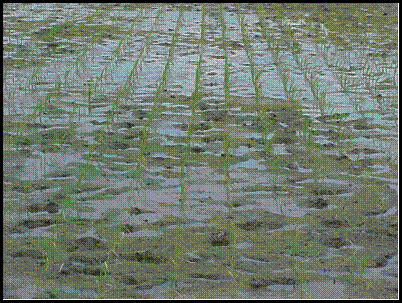
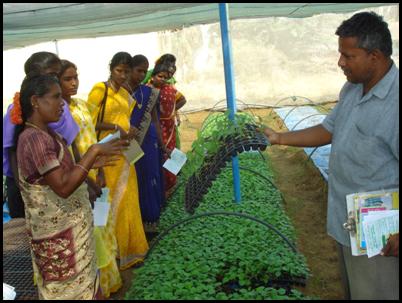 Intervention of KVK :
Intervention of KVK : 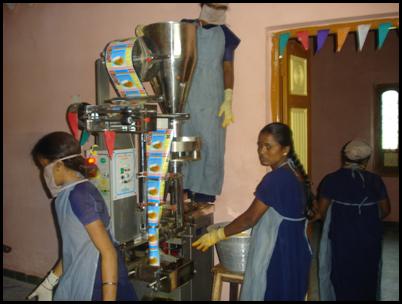 Ms. Ponni (Good luck), Ms. Susila (Chevanthi), Ms.Rama (Thentral), Ms. Kamatchi (Kaliyamaman), Ms. Saraswathi (Thulukanathamman) and Ms. Manju (Om sakthi) are the active self help group members in Vandavsi block of Thiruvannamalai district.
Ms. Ponni (Good luck), Ms. Susila (Chevanthi), Ms.Rama (Thentral), Ms. Kamatchi (Kaliyamaman), Ms. Saraswathi (Thulukanathamman) and Ms. Manju (Om sakthi) are the active self help group members in Vandavsi block of Thiruvannamalai district. 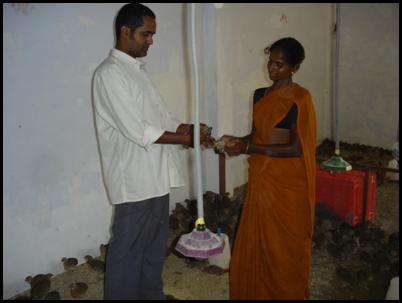 The above 22 members of 5 SHG’s attended a 5 days NABARD sponsored training on Japanese quail and Giriraja bird rearing conducted by SMS (Animal science), Organized by
The above 22 members of 5 SHG’s attended a 5 days NABARD sponsored training on Japanese quail and Giriraja bird rearing conducted by SMS (Animal science), Organized by 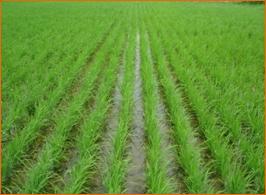 After several experiments conducted in our KVK farm, our scientists made various modifications in the SRI cultivation to suit the local condition. Instead of rope, rotary marker has been suggested for square planting which is more suited for SRI method. Trainings and field days have been conducted in our farm for its popularization.
After several experiments conducted in our KVK farm, our scientists made various modifications in the SRI cultivation to suit the local condition. Instead of rope, rotary marker has been suggested for square planting which is more suited for SRI method. Trainings and field days have been conducted in our farm for its popularization.